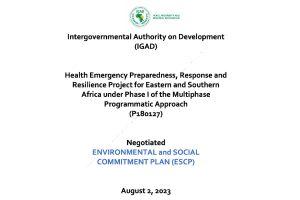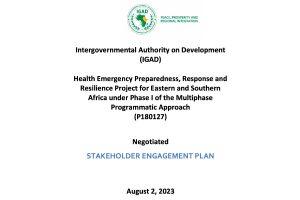 ENVIRONMENTAL and SOCIAL COMMITMENT PLAN (ESCP)
ENVIRONMENTAL and SOCIAL COMMITMENT PLAN (ESCP)
- Intergovernmental Authority on Development (IGAD) (the Recipient) will implement the IGAD regional components of the Health Emergency Preparedness, Response and Resilience Project for Eastern and Southern Africa under Phase I of the Multiphase Programmatic Approach (P180127) (the “Project”). The International Development Association (hereinafter the “Association”) has agreed to provide financing for the Project.
- The Recipient shall ensure that the Project is carried out in accordance with the Environmental and Social Standards (ESSs) and this Environmental and Social Commitment Plan (ESCP), in a manner acceptable to the Association. The ESCP is a part of the Financing Agreement. Unless otherwise defined in this ESCP, capitalized terms used in this ESCP have the meanings ascribed to them in the referred Financing Agreement.
- Without limitation to the foregoing, this ESCP sets out material measures and actions that the Recipient shall carry out or cause to be carried out, including, as applicable, the timeframes of the actions and measures, institutional, staffing, training, monitoring, and reporting arrangements, and grievance management. The ESCP also sets out the environmental and social (E&S) instruments that shall be adopted and implemented under the Project, all of which shall be subject to prior consultation and disclosure, consistent with the ESS, and in form and substance, and in a manner acceptable to the Association. Once adopted, said E&S instruments may be revised from time to time with prior written agreement by the Association.
- As agreed by the Association and the Recipient, this ESCP will be revised from time to time if necessary, during Project implementation, to reflect adaptive management of Project changes and unforeseen circumstances or in response to Project performance. In such circumstances, the Recipient and the Association agree to update the ESCP to reflect these changes through an exchange of letters signed between the Association and the Recipient through the Executive Secretary. The Recipient shall promptly disclose the updated ESCP.
 STAKEHOLDER ENGAGEMENT PLAN
STAKEHOLDER ENGAGEMENT PLAN
1.1 IGAD Region Context
- The Intergovernmental Authority on Development (IGAD) is one of the Regional Economic Communities (RECs) and a pillar of African Union (AU). IGAD encompasses eight (8) Member States, namely Djibouti, Eritrea, Ethiopia, Kenya, Somalia, South Sudan, Sudan and Uganda. The IGAD region stretches over 5.2 million Km2 with an estimated population of 270 million inhabitants. The region hosts over 4.5 million refugee population, 12 million IDPs and a significant population of pastoralists and cross border mobile population.
- Initially, the Intergovernmental Authority on Drought and Development (IGADD) was established in 1986 by Djibouti, Ethiopia, Kenya, Somalia, Sudan and Uganda to jointly address drought and mitigate its impact in the region. In 1996, the IGADD was transformed into Intergovernmental Authority on Development (IGAD) superseding the earlier and broadening its mandate to include development. More specifically, it was mandated to assist and complement member States’ efforts to achieve peace, prosperity and regional integration and assist efforts of Member States to collectively combat drought and other natural and man-made disasters and their consequences through:
- Increased cooperation for food security and environmental protection.
- Promotion and maintenance of peace and security and addressing humanitarian affairs.
- Economic cooperation and integration as well as health social development.
- Two countries were included which increased the number of the member states to 8 and two are; South Sudan and Eritrea The Authority comprises of the Assembly of Heads of states and Governments, a council of Ministers, a Committee of Ambassadors and Secretariat. The Secretariat operates through these policy organs and Sector Ministerial and Technical Committees while collaborating with various stakeholders and executing its mission.
- The IGAD region is characterized with frequent disease outbreaks, natural disasters and conflicts often resulting in humanitarian crisis. The immense humanitarian crisis is often occasioned by large population of refugees and the Internally Displaced Persons (IDP’s) in a number of the member states. The crises impact heavily on the already fragile health systems resulting to weakened health system affecting the entire chain of continuum of health care in the region. Constant movement of population, goods and services, labor, refugee and displaced persons across borders in the IGAD region predisposes the vulnerable cross border communities to acute public health events and transboundary diseases that collectively endanger the health of the population in the region and international borders. Ensuring necessary collective action for health at both national and regional level is vital in addressing the regional health security.

